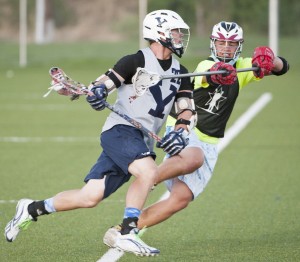It’s 5 a.m., and Hayden Dixon, a sophomore from Las Vegas, is not in his bed. He’s at lacrosse practice. These three to five-hour practices happen every day, all year long.
Dixon’s dedication is typical for BYU club athletes who do not receive scholarships for athletics. Not only do they give up their time, but also their financial resources in order to play for the university.

Lacrosse, for example, is expensive. The sport requires helmets, pads, cleats, gloves and sticks. The price of each piece of equipment varies but can be as much, or as little, as $100.
“I’ll probably go through two cleats, a pair of gloves and three sticks this season,” Dixon said.
Luckily for the lacrosse team, sponsors provide the necessary equipment. In the past, Reebok sponsored the team; however, Gait, a brand of lacrosse gear, now carries the torch. “We wear their stuff and they take care of us,” Dixon said.
Other costs are associated with the sport, even though the equipment is provided. According to Dixon, each player costs the program about $6,000, which is covered by BYU, players, donations and sponsorships.
The lacrosse team uses all available resources to save money while on the road. On various occasions, Dixon and his teammates have eaten meals prepared by members of The Church of Jesus Christ of Latter-day Saints.
“We work with members of the Church where we’re playing,” Dixon said. “Sometimes we’ll stay with families where we’re playing, and they’ll take care of us.”
Even after the generosity of others in alleviating costs, the lacrosse players are still responsible for about $2,200 per season. Players may pay the amount themselves, or they can find families and companies to sponsor them.
The lacrosse program is currently trying to establish an endowment program that would eventually eliminate all costs to the players. But until then, BYU lacrosse requires a lot of time and money. Dixon feels it’s worth it.
“I was never interested in coming to BYU,” Dixon said. “As a missionary I was applying to different schools, and I had opportunities to play elsewhere, but I prayed and felt that I should come here. BYU gives me an opportunity to go to a faith-based school.”
And it’s not just lacrosse players making financial sacrifices to play. Will Taylor, a senior from Tennessee, forgoes his free time in order to play rugby for BYU.
The rugby team practices two hours per day, six days per week. Most of the athletes lift for an additional one and a half hours, three days a week. Overall, some players practice for 16.5 hours per week.
Before Taylor got married, he said he was very busy “working 20 hours while doing a full load of school and playing rugby.”
Adding to the time commitment of rugby, Taylor, as well as the rest of the team, pays $550 at the beginning of the season, and about $20 to $40 each time the team travels.
Now in his fourth year of playing, Taylor said he has given up a lot of time and money to rugby, but he is grateful for the opportunity.
“It’s a good program that’s been successful,” Taylor said. “I’ve been able to win three national championships, and my best friends have come from the team.”
Similarly, the BYU hockey team forfeits time and money for a chance to compete.
In addition to their rigorous training schedule, they pay $1,500 at the beginning of the season, about $2,000 for their equipment and sometimes cover food expenses while traveling.
The team actively fundraises to reduce these costs, but Ryan Bonham, BYU hockey’s general manager from Draper, recognizes the sacrifice and believes students decide to play hockey because of their character.
“They choose to play because they love the school, and they love the game,” Bonham said.
Colby Bauer, a senior member of the men’s soccer team, almost decided not to play in this upcoming season after playing two seasons last year, one for BYU–Hawaii and practicing about 20 hours a week.
“My body was tired. If I had my way I probably would’ve not played, but I reunited with the guys, the coaches and the environment, and I felt the passion again,” Bauer said. “I was totally down and ready to quit, but I love the team and the coaches. The guys make it worth it.”




